Key Highlights in 2020
The Republic of Maldives is located in the Indian Ocean, southwest of Sri Lanka and India. The country comprises 1,192 coral islands, which are divided into 26 major island rings, known as atolls. For administrative purposes, these 26 atolls are organised into nineteen administrative districts across an area of 90,000 square kilometres in the Indian Ocean.
Famous for its natural beauty with white sand beaches and crystal-clear waters, the Maldives is ranked as one of the best diving destinations in the world. Tourists seeking leisure and relaxation are especially attracted by the breath-taking scenery, peace, and quietness of the Maldivian islands.
.jpg)
Due to the COVID-19 pandemic, the Maldives’ overall economy has contracted by 18.6% in 2020. This is attributable to its strong dependence on international tourism, which has been negatively impacted worldwide due to lockdowns and travel restrictions.
According to the World Travel & Tourism Council (WTTC), the total contribution of tourism to the Maldives’ Gross Domestic Product (GDP) in 2019 was 11.5%.
Tourism arrivals have slumped from approximately 1.7 million in 2019 to approximately 555,000 in 2020 due to the travel disruptions caused by COVID-19.
The Maldives hotel investment market recorded zero transaction volume in 2020 amidst the global economic uncertainty, the only year in the last five years (2016 to 2020) to record zero transaction volume.
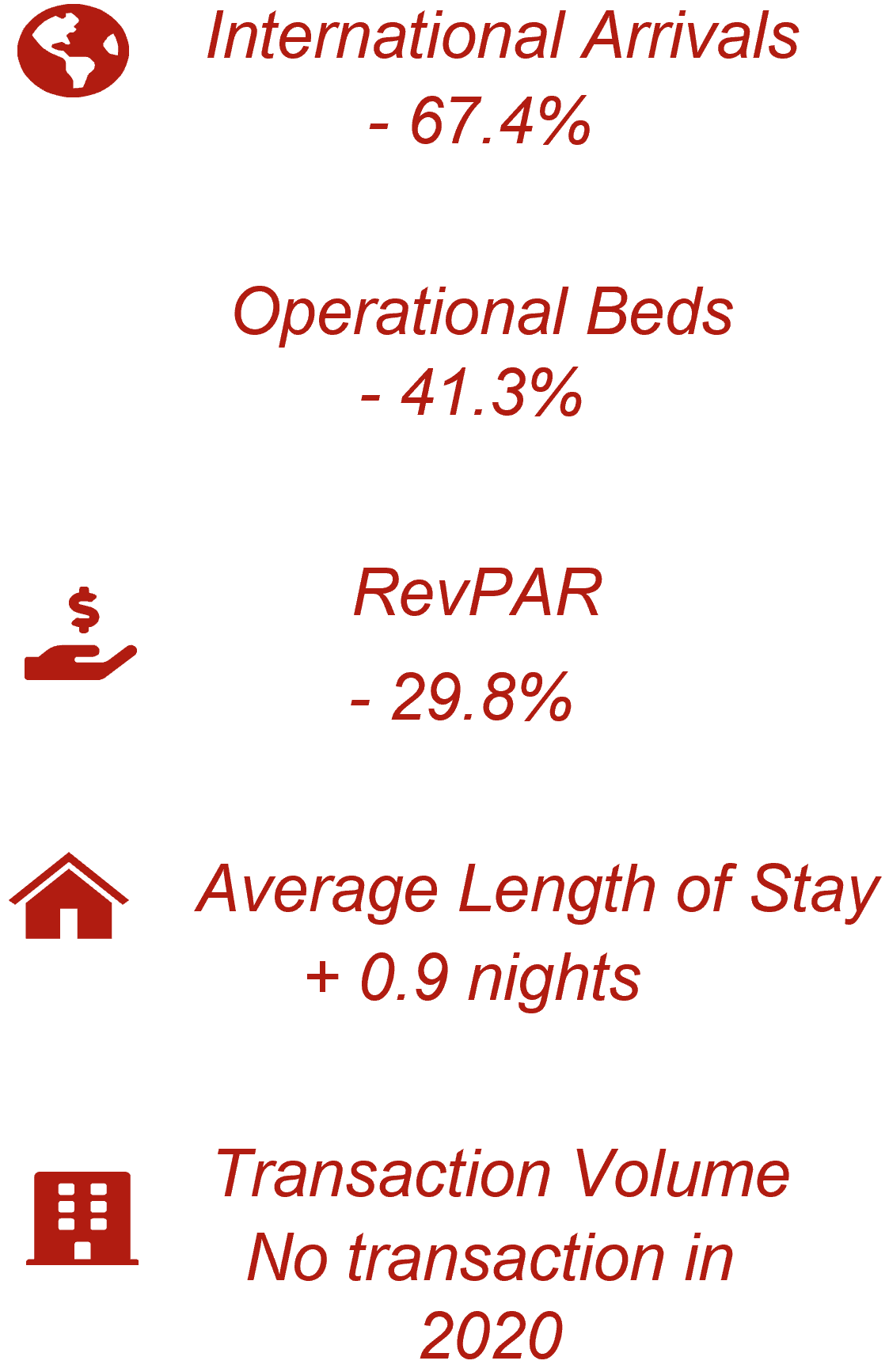
Economic Outlook
In 2020, the global economic growth was rocked by the COVID-19 pandemic that caused countries to go into lockdown and stock markets to plunge. Activities around the world have seemingly come to a halt with travelling restricted and work-from-home becoming a new normal. US-China political tension continues to be uncertain, along with the plans for Brexit. With growing uncertainties in the geopolitical landscape and global market pressures, international trade and investment activities have softened and are expected to remain subdued. According to the World Bank, global economic growth is projected to expand at 4% in 2021, albeit a slow recovery.
Figure 1: Economic Outlook
.png)
Economic Performance & Outlook
Given the reliance of the Maldives’ economy on international tourism and related development, the slowing of the travel industry and construction activities due to COVID-19 has resulted in a 32.2% contraction in real GDP growth in 2020. Recovery is expected in 2021 with an expansion of 18.9% as economic activities gradually resume and consumer sentiment improves with the administration of the vaccine. Furthermore, the Maldives has one of the most relaxed regulations for international visitors, and the “one-resort-one-island” concept helps to enhance exclusivity amidst social distancing regulations.
Currency Account Balance
In 2020, the Maldives’ current account balance (% of GDP) has declined from -20.4% in 2019 to -24.4% in 2020. This is likely attributed to the loss of income from tourism activities on the back of a weaker international travel market and slowing of construction activities, on which the Maldives is heavily dependent.
Inflation
Due to the pandemic, consumer price inflation for Maldivian rufiyaa has declined from 1.3% in 2019 to -1.6% in 2020. This is due to a decline in global oil prices in 2020 and the sluggish recovery of domestic demand. The country is largely dependent on imports, including fuel, to meet its domestic demand. Consumer prices are therefore responsive to movements in international commodity prices, particularly oil prices. Moving forward, International Monetary Fund (IMF) expects the inflation rate to increase to 1.6% in 2021 as it emerges from a low base. This is owing to the recovery in global energy and nonenergy prices and the general recovery of the economy. IMF forecasts that inflation will rise by an annual average of approximately 2.0% in the next four years from 2022 to 2025.
Infrastructure Developments
2020
- Horafushi Airport: Horafushi Airport: A domestic airport serving the island of Hoarafushi, in the northernmost Haa Alif Atoll. The new airport is constructed on reclaimed coastal land.
- Funadhoo Airport: A domestic airport that serves the inhabited islands of the Shaviyani Atoll. The airport is located on the nearby island of Farukolhufunadhoo.
- Maavarulu Airport: A domestic airport serving the Gaafu Dhaalu Atoll.
2021
- Madivaru Airport: A domestic airport expected to serve the island of Madivaru, Lhaviyani Atoll.
- Fari Islands: A multi-resort concept that features three international hospitality brands, Capella, Patina, and The Ritz-Carlton. The development is located in North Malé Atoll, 50-minutes by speedboat from Malé International Airport. The archipelago also features the picturesque Fari Marina, built around a vibrant Fari Beach Club, charming boutiques, and a selection of handpicked, upscale food and beverage options. The ongoing development has opened the 100-key Ritz-Carlton Maldives on 1 June 2021.
2023
- CROSSROADS Maldives: Situated amongst the Kaafu Atoll and Emboodhoo Lagoon, CROSSROADS Maldives is the first extraordinary multi-island, fully integrated leisure destination. The development has opened two resorts: 198-key SAii Lagoon Maldives - Curio Collection by Hilton and 178-key Hard Rock Hotel Maldives. The islands are connected by footbridges for guests to explore the integrated hub. It features shopping, dining, a marina, spas, the Marine Discovery Centre, and more. The development is expected to inaugurate an 80-villa SO/Maldives on Island 3 in 2023.
Other Notable Projects (No Specified Completion Date)
- Hanimaadhoo International Airport Expansion: The airport expansion is considered one of the largest infrastructure and connectivity projects in the northern Maldives. The project includes the upgrade of terminals, fuel farms, and the fire station, as well as the extension of the runway to 2200 meters, allowing accommodations for A320s and Boeing 737s.
- Hulhumalé: This ongoing development located in the south of North Malé Atoll aims to act as an expansion of Malé City. The city will adopt a global lifestyle, focused on investing for the long-term future, nurturing the youth, and forming new traditions for the anticipated 240,000 residents of the city.
- Greater Malé Connectivity Project: The USD 500 million ongoing project aims to connect three neighbouring islands, namely, Villingili, Gulhifahu, and Thilafushi through a 6.7-kilometre bridge and causeway network. The project will boost economic activity, generate employment and promote urban development in Hulhumalé, Hulhule, and Malé with the proposed Gulhifalhu Port and the Thilafushi Industrial Zone.
-
Velana International Airport Expansion: The ongoing USD 1 billion airport expansion comprises a 78,000-square-metre international passenger terminal building that will have the capacity to accommodate up to 7.5 million passengers a year upon its completion in 2022. The airport handled more than 4.8 million passengers and 54,000 flight movements in 2019. A new 3,400-metre-long and 60-metre-wide code-F runway is also being built to accommodate wide-body aircraft such as A380. The runway is expected to resolve the issues related to space and flight delays.
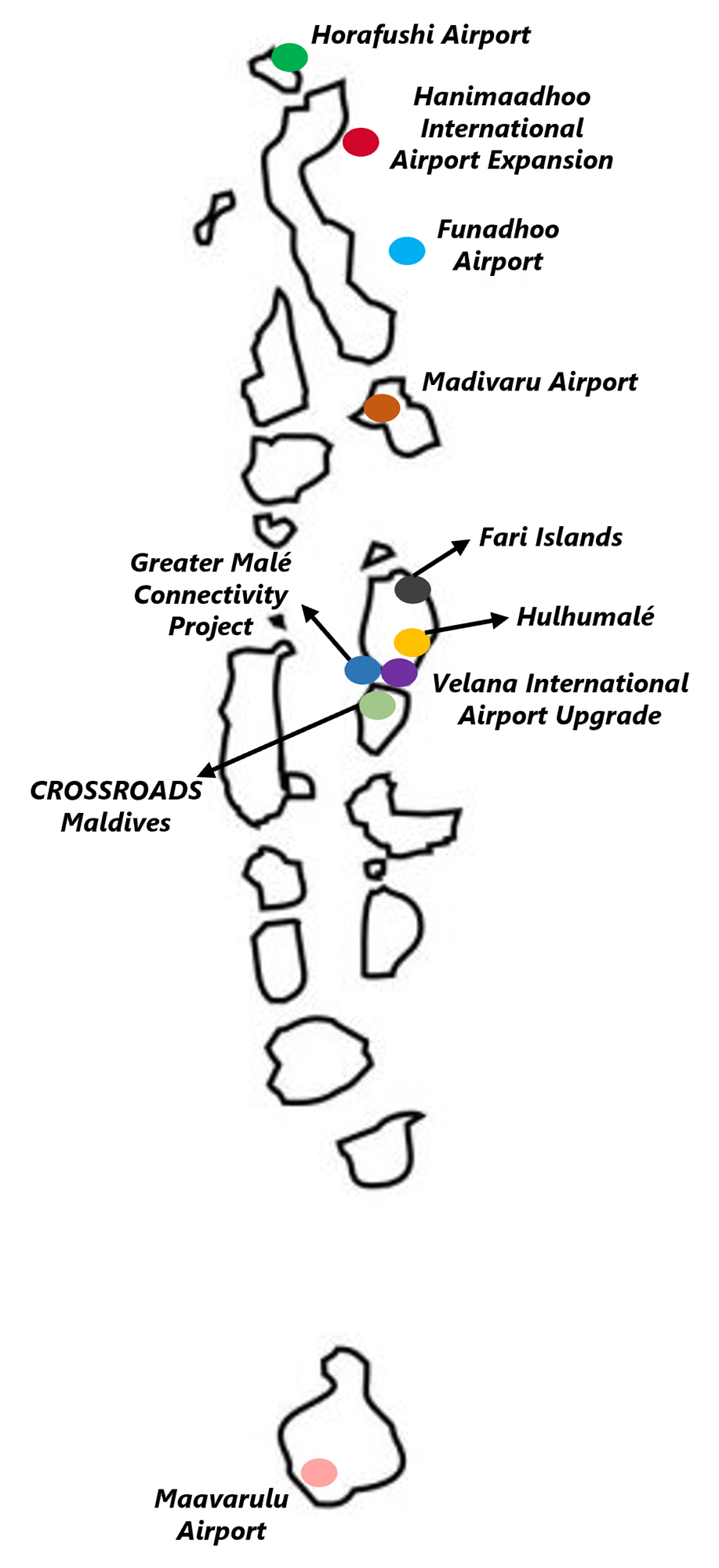
Maldives Tourism Landscape
International Visitor Arrivals
According to the Maldives’ Ministry of Tourism (MOT) figures, international visitor arrivals have increased for four consecutive years to reach a record of approximately 1.7 million visitor arrivals in 2019 before decreasing by 67.4% to approximately 555,000 in 2020 due to the travel restrictions brought about by COVID-19.
Figure 3: International Visitor Arrivals (2016-2020)
.png)
Source: Ministry of Tourism Maldives
Seasonality
The seasonality in the Maldives is rather volatile but consistent due to visitors’ travel patterns. From December to March, the Maldives experiences a higher volume of visitors due to occasions such as Christmas, New Year, and Valentine’s Day. The Maldives has the best weather between November and April as it is cooler. The monsoon runs from May to October, peaking around June which explains the trough in May and June.
In 2020, the Maldives has exhibited abnormal seasonality due to the lockdown from 27 March 2020 to 15 July 2020. Since the reopening in July, the Maldives has recorded gradual growth in arrivals for the remaining months of the year.
.png)
International Source Market
In 2020, India overtook China as the top international source market after China has dominated as the top source market for the past four years. This may be attributed to the restrictions imposed on Chinese visitors when the COVID-19 virus was first recorded in China in December 2019. Aside, Russia has emerged as one of the top five source markets due to the availability of flights from Russia to the Maldives in 2020.
The top five international source markets to the Maldives in 2020 were: India (11.3%), Russia (11.1%), United Kingdom (9.5%), Italy (8.4%), and Germany (6.6%). The five markets made up almost half of the total visitor arrivals to the Maldives in 2020.
Due to the social distancing measures imposed globally, the Maldives has capitalised on its unique concept of “one-island-one-resort” to emphasise its exclusivity to promote the destination.
.png)
Source: Ministry of Tourism Maldives
Average Length of Stay (ALOS) increased by 0.9 nights, reaching 7.2 nights in 2020 due to extension of stays to avoid restrictions in guests’ home country, whereas some guests were stuck on the island during the lockdown in the Maldives.
Figure 6: Average Length of Stay and Tourism Receipts (2019-2020)
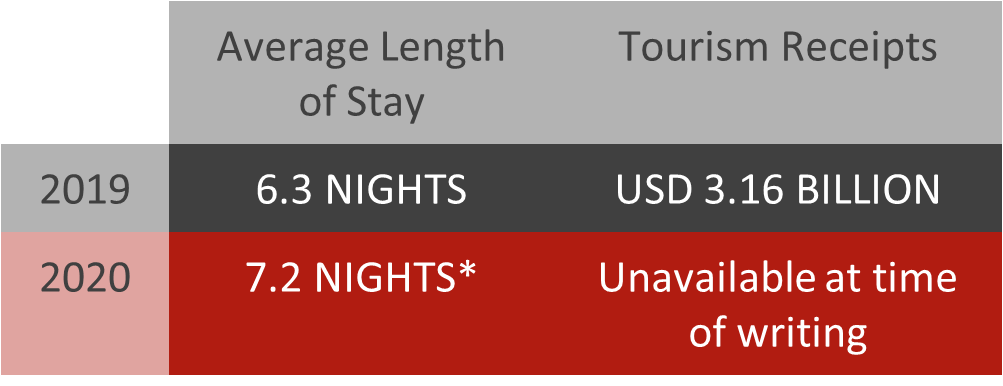
*April, May and June 2020 average stays are estimated due to lockdown
Maldives Hotel Market
2020 was a quiet year in terms of hotel supply growth in the Maldives. The marketwide room supply only grew by 1.9%. HVS noted the opening of Radisson Blu Resort Maldives and Brennia Maldives, which added 128 and 193 rooms to the market, respectively. Properties such as Ritz-Carlton Maldives Fari Islands and Capella Maldives that were supposed to open in late 2020 were delayed due to the pandemic.
Based on the figures from MOT, there was an average of 966 registered accommodation establishments in 2020, however only an average of 389 establishments was operational, which equates to approximately 40% of the supply. In comparison to 2019, there was an average of 886 registered accommodation establishments and 873 were operational, which translates to approximately 99% of the supply. This has demonstrated a stark difference in the change of operational supply during COVID-19.
Moving forward, HVS will track the opening of six properties in 2021, which will introduce 1,170 rooms into the market. Between 2022 and 2025, an additional 1,593 rooms are expected to be added to the Maldives’ hotel supply. The hotels slated to open are mainly positioned in the upscale and luxury segments.
Hotels Opening in 2021:
- AVANI Fares Maldives Resort, 200 keys
- Gran Melia Huravee, 96 keys
- Indus Maldives Resort & Spa, 170 keys
- Le Meridien Maldives Resort & Spa, 154 keys
- Oblu X Malé Atoll, 350 keys
- OZO Maldives, 200 keys
Hotels Opening in 2022:
- Alila Villas Maldives, 80 keys
- Amari Kudu Kurathu Maldives, 200 keys
- Capella Maldives, 64 keys
- HYDE Maldives Feydhoo Finolhu, 125 keys
- Oblu South Malé Atoll, 150 keys
- OZEN Retreat South Malé Atoll, 30 keys
- The Chatwal Maaga Maldives, 88 keys
Hotels Opening beyond 2022:
- Centara Kassanaufaru Resort & Spa Maldives, 130 keys
- Centara Hotels & Resorts Maldives, 165 keys
- Centara Lagoon Family Island Resort & Spa Maldives, 145 keys
- Centara Grand Muthaafushi Resort & Spa, 101 keys
- JW Marriott Maldives Malé Atoll Resort & Spa, 80 keys
- Mondrian Feydhoo Finolhu, 125 keys
- Novotel Maldives Keredhdhoo, 110 keys
- SO/Maldives, 80 keys

*All count includes independent properties
Maldives Hotel Market Performance
With the growth of international arrivals from 2016 to 2019, the Maldives has exhibited an upward trend in occupancy, registering a compounded annual growth rate (CAGR) of 2.0% between 2016 to 2019 despite having a strong pipeline of hotels. On the other hand, the Average Room Rate (ARR) has shown a downward trend as hotel supply, particularly midscale products, continues to grow in the Maldives, increasing the competition level in the accommodation market. As a result, the RevPAR has shown some fluctuations between 2016 and 2019. The RevPAR increased 2.5% in 2017, while 2018 and 2019 have recorded a declining performance, registering a CAGR of -7.4% in the two years.
In 2020, the Maldives recorded its worst performance in terms of occupancy in the last five years. This is attributable to the travel disruptions caused by the COVID-19 pandemic. Marketwide occupancy declined by 33.7 percentage points (p.p.) while ARR increased by 44.3%. Overall, RevPAR decreased by 29.8%, the sharpest decline over the past four years.
The Maldives has managed to achieve an abnormally high ARR in 2020 due to resort closures and the selling of higher room categories when travel restrictions were introduced globally. With the high ARR, the Maldives has managed to bolster its RevPAR in 2020. This may also be a result of the MOT’s marketing effort to capitalise on the “one-island-one-resort” concept to incentivise tourist arrivals into the nation. In November 2020, the MOT has launched its marketing campaign with the tagline, “Isolation never looked this good.” Furthermore, the Maldives has by far imposed one of the most relaxed travel regulations for international visitors. The destination has recorded a strong increase in visitor arrivals since the reopening of its borders in mid-July 2020, albeit at a lower number than before.
Moving forward, with many countries still implementing travel restrictions and the limited availability of flights worldwide, the tourism sector in the Maldives is likely to be negatively impacted in the short term but should still fare relatively well in the Asia-Pacific. Until the vaccine has been largely administrated globally, the uncertainty of resurgence in infections and reimposition of lockdowns will remain, which can result in dampening of business and consumer sentiments and impact visitors’ decision to travel.
Figure 8: Maldives Overall Hotel Performance (2016-2020)
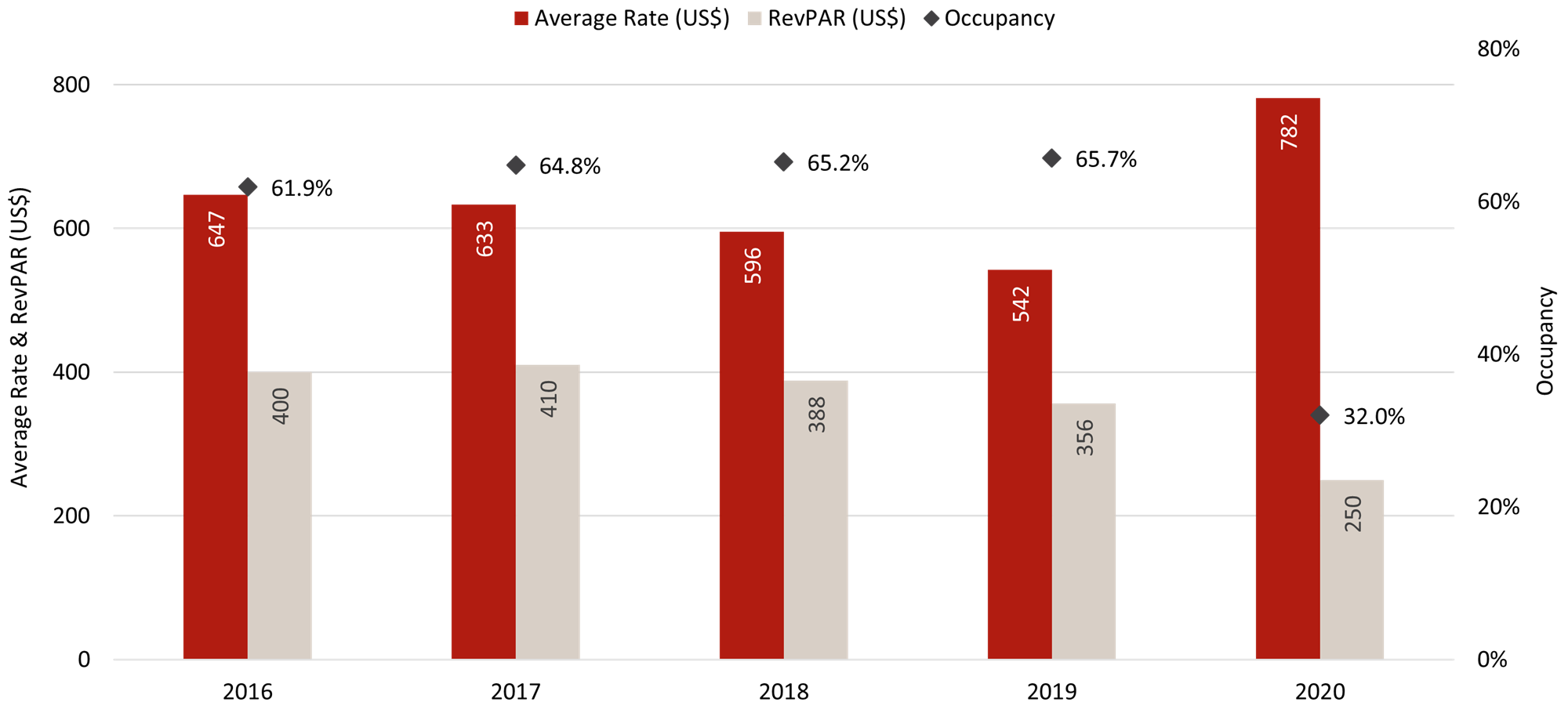
Tourism Models in the Maldives
Workation and Long-Staying Tourism in the Maldives
Due to the ongoing COVID-19 pandemic, remote working has become a norm and accommodation establishments have rolled out a series of long-staying and work-from-home packages. The Maldives benefits from the “one-island-one-resort” concept which allows for social distancing among travellers as each island operates like its own resort. The Maldives is also among the first countries to initiate vaccine tourism with the 3V (Visit, Vaccinate, Vacation) Campaign which further promotes long-stay. The greater emphasis on flexibility and work-life balance may spur the rise of bleisure — a segment of long-staying workationers. In April 2021, Tourism Minister Dr. Abdulla Mausoom has stated that the government is making arrangements to extend tourist visas up to one year.First introduced in 2011, Maldives-based Soneva Resorts and Residences was the first and only company to offer Maldivian real estate to foreign buyers through the Soneva Villa Ownership Program. The benefits include discounts on all Soneva resort services, flight transfers, owner benefits, exchangeability of owner’s days within all Soneva Resorts, income sharing in a Villa Rental Program, and the privilege to allow for interior villa customisation.
Just last October 2020, Singapore-based Banyan Tree Holdings Limited has rolled out a new extended-stay product known as Habitat. The new offering aims to bring in a new way of living, working, and travelling for seasonal travellers, families and remote workers. Using the Habitat Pass, guests have access to 35 hotels in more than 30 destinations under the group’s house of brands: Banyan Tree, Angsana, and Cassia. Valid for twelve months, they can purchase from one to four units at a time, granting stays ranging from seven to 28 days in multiple properties across different destinations. Credits ranging from USD 150 to USD 700 are given based on the number of units purchased, which can be used for food and beverage, spa and wellness activities, laundry services, and airport transfers.
On 5 November 2020, Anantara Veli Maldives Resort offered the ‘Unlimited Stays in Paradise’ package for bookings till 30 November 2020, which allows unlimited nights at the resort for a one-time fee priced at USD 30,000, inclusive of all taxes and service charges, for two persons sharing one Over Water Bungalow. The package is valid for stays from 1 January 2021 to 23 December 2021 and includes daily breakfast for two, a 25% discount on spa services and dining, and complimentary WiFi.
Figure 9: Habitat by Banyan Tree
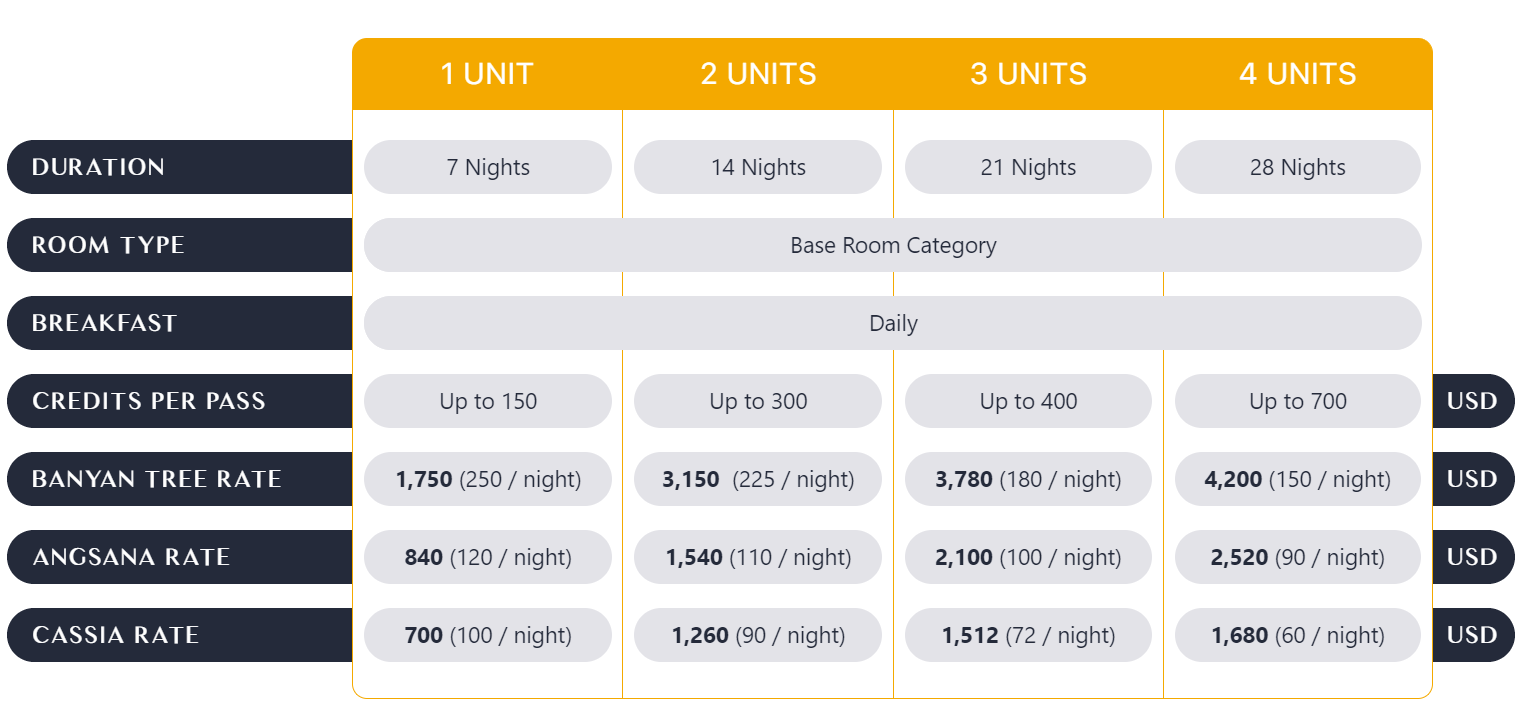
Another move to diversify the Maldives’ product offering can be seen from the first multi-island integrated resort CROSSROADS which was launched in September 2019. Developed by Thailand-based Singha Estate Public Company Limited, the project comprises nine artificial islands connected by footbridges. Phase one of the project has been completed with 198-key SAii Lagoon Maldives, a Curio Collection by Hilton, 178-key Hard Rock Hotel Maldives, Maldives Discovery Centre, Marine Discovery Centre, the Marina, and the 326-square-metre event hall. Phase two of the project will take another five years to complete, featuring a mix of hotels and long-stay residences, details of which have not yet been disclosed. Just last July 2021, it was unveiled that the 80-key SO/Maldives will be the jewel of the third island on CROSSROADS. The first co-working space in the Maldives will also be featured as part of the CROSSROADS project.
However, concerns about rising sea levels may impact the interest of potential investors in these long-stay tourism models in the Maldives. More funding is required for coastal protection works and to build critical infrastructure like sea walls. In May 2021, it was announced that the Maldives is creating an innovative floating city that mitigates the effects of climate change. Designed by Netherlands-based Dutch Docklands, The Maldives Floating City will feature thousands of waterfront residences, hotels, shops, restaurants, a hospital, a school, and public spaces floating along a flexible, functional grid across a 200-hectare lagoon. Construction is slated to commence in 2022 and the development will be completed in phases over the next five years.
Guest House Culture in the Maldives
The Maldives offers various types of accommodation to cater to different preferences which are categorised into resorts, hotels, guest houses, and safari vessels.
The relaxation of its tourism rules which was restricting all tourism to resorts on uninhabited islands has sparked the growth of guest house tourism over the years. Apart from the differences in service, quality, and product offerings, the main difference between guest houses and resorts are that guest houses do not own their own island. Similar to resorts, there are opportunities to engage in excursions, watersports, diving, and other activities. Tourists in the guesthouses will be able to experience living like a local and are expected to be respectful of the local community. Guest houses have boosted the growth and development of mid-market tourism, offering an alternative to budget-conscious and cultural travellers. In 2021, the Maldives has been actively promoting local tourism and guest houses as part of their economic diversification plans.
It is also noted that a reliable and affordable public transport service, good service quality and safety standards are essential for the growth of guest houses.
Hotel Transactions and Investment
Zero Transaction Volume in 2020
Hotel investment in the Maldives has exhibited a fluctuating trend in the past four years, between 2016 and 2019, registering an average of three transactions annually. In 2019, the Maldives recorded five transactions in total, the highest number of transactions between 2016 and 2019. Generally, the Maldives’ hotel investment market has been dominated by foreign investors.
In 2020, the Maldives has recorded zero transaction volume in the hotel investment market. The market has been active throughout the past four years, with investment volume peaking in 2019 at USD 438 million.
However, in 2020, the global economy has slowed, consumer sentiments have weakened, and the accommodation market was negatively impacted by travel disruptions. As a result, the hotel investment market has been quiet in 2020.
Notable transactions in 2019:
- 151-key Conrad Maldives Rangali Island at USD 180 million (USD 1.19 million/key)
- 110-key Anantara Dhigu Maldives Resort at USD 97 million (USD 883,000/key)
- 67-key Anantara Veli Maldives Resort at USD 59 million (USD 883,000/key)
As of YTD August 2021, Maldives has recorded one transaction. The 80-key Kanuhura Maldives has been acquired at USD 41.5 million (USD 519,000/key). This suggests that investors’ confidence in the Maldives hotel market has recovered to some extent.
Figure 10: Maldives Hotel Transactions (2016 - 2020)
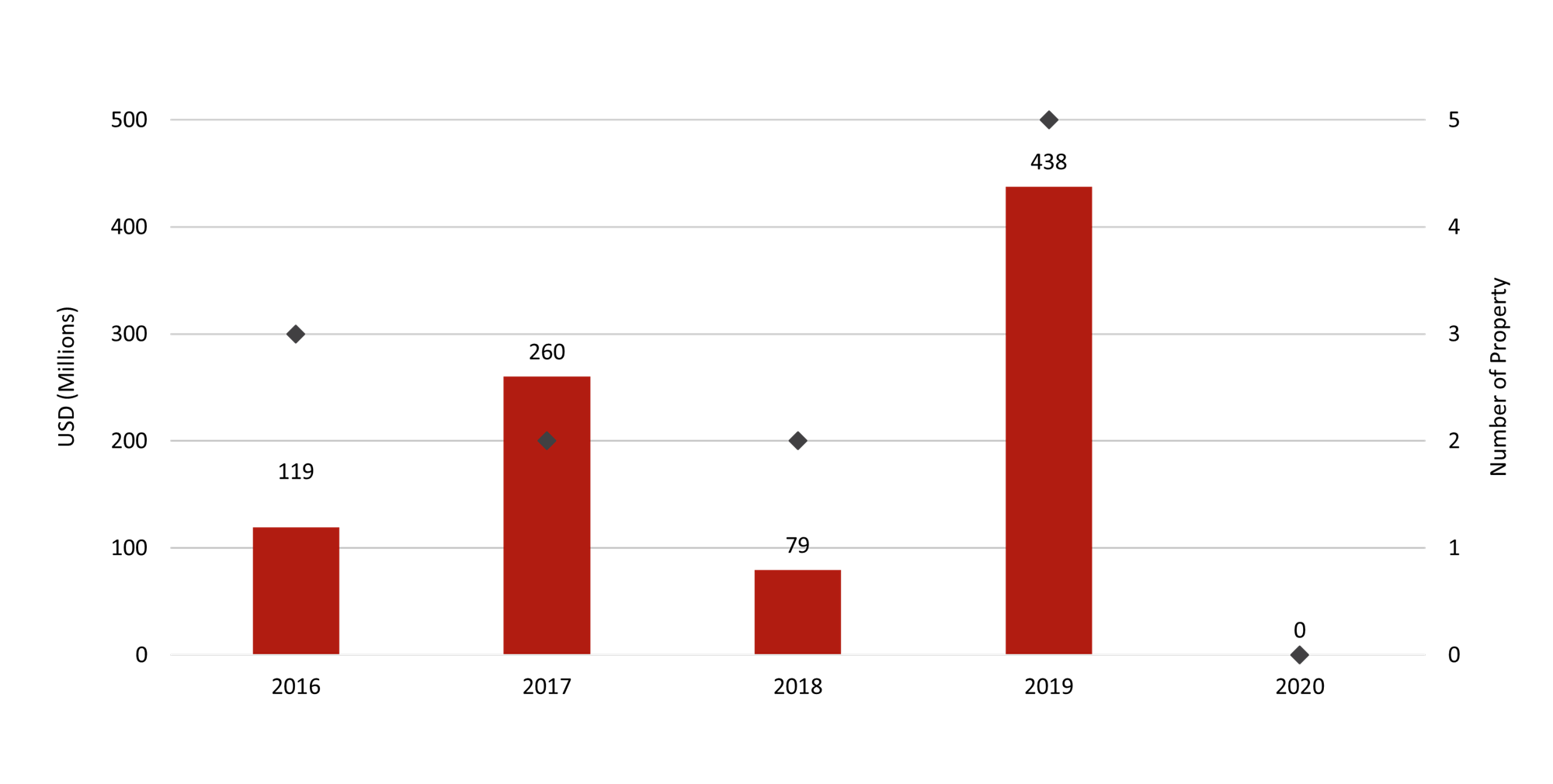
Inbound Hotel Investment Dominated by the United States
From 2016 to 2019, inbound investment in the Maldives has been dominated by investors from the United States. They have acquired a total of five properties, amounting to a total investment volume of approximately USD 378 million, equivalent to USD 944,000 per unit.
This is followed by Singapore and Thailand, which have acquired three properties each, with a total investment volume of USD 161 million and USD 84 million, respectively. The remaining countries, namely, Germany, Japan, and Sri Lanka have acquired one property each.
It is evident that the United States investors have been actively investing in the Maldives market, which averages to approximately one hotel acquisition per year.
In terms of investors’ profile in totality, Asia-Pacific leads the way with four out of six countries belonging to the Asia-Pacific region. Europe, the Middle East, and Africa regions are shown to be less active in the Maldives hotel investment market. As of YTD August 2021, the transaction of the 80-key Kanuhura Maldives was made by a Singapore investor.
Figure 11: Investor Profile for Maldives Inbound Hotel Transactions
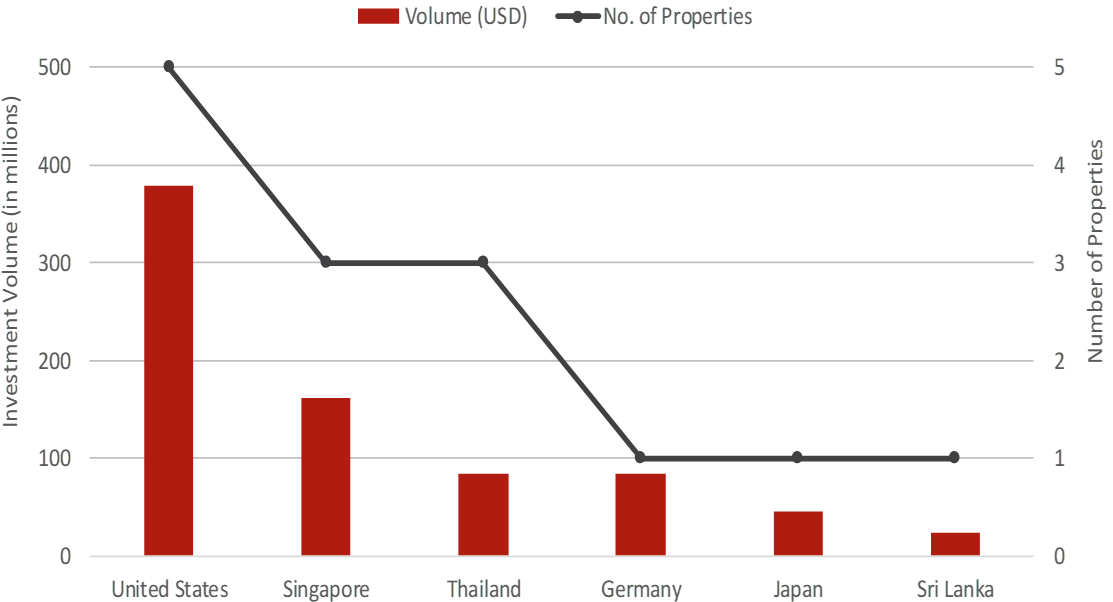
Covid-19 Timeline
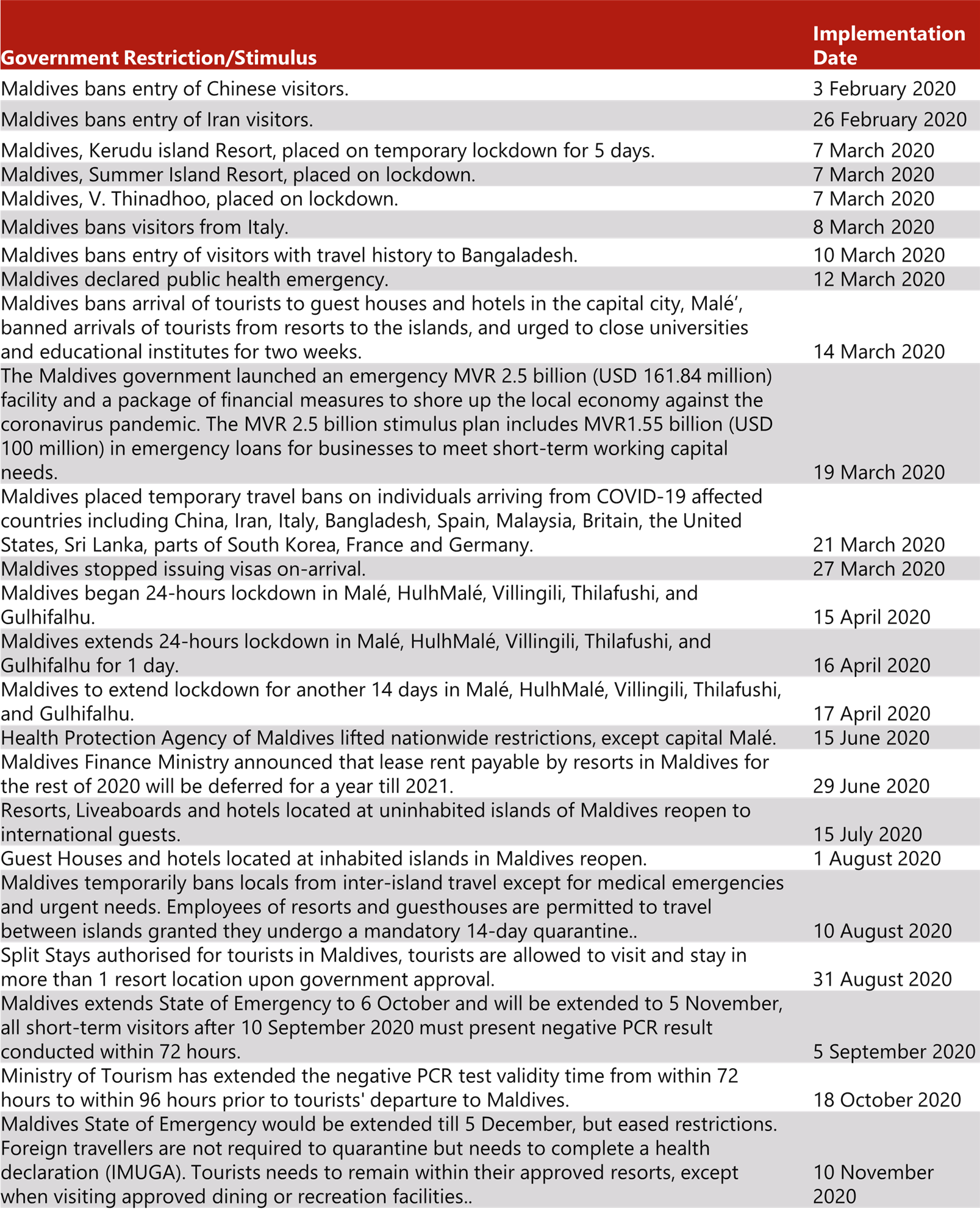
.png)
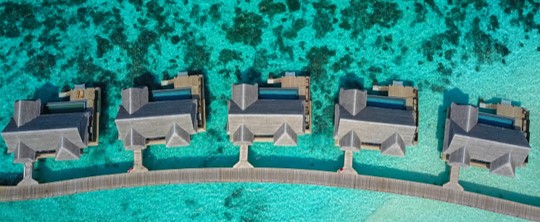
Outlook
In 2020, the Maldives market recorded its greatest decline in international arrivals and poorest hotel performance in recent years due to the travel restrictions brought upon by the COVID-19 pandemic. The Maldives has recorded a decline of 33.7 p.p. in occupancy and an increase of 44.3% in ARR, contributing to an overall decrease of 29.8% in RevPAR. With many countries still implementing travel restrictions to control the spread of the coronavirus, the demand for tourism in the Maldives is likely to remain subdued in the short term due to the lack of international visitor arrivals. . Until the vaccine has been largely administrated globally, the uncertainty of resurgence in infections and reimposition of lockdowns will remain.
As a prominent beach destination in Asia-Pacific, the Maldives has strong mindshare in couples looking for a honeymoon destination, diving enthusiasts searching for diving spots that feature rich marine biodiversity, and families seeking private and exclusive bonding time during vacation.
The Maldives have won multiple travel accolades in 2020 itself, this includes: “Indian Ocean’s Leading Beach Destination”, “India Ocean’s Leading Dive Destination”, “Indian Ocean’s Leading Cruise Destination” and “Indian Ocean’s Leading Destination”.
In terms of supply pipeline, HVS notes that there is an additional 20 resorts in the pipeline that will be opened by 2025. It is anticipated to add 2,763 rooms to the market. The hotel market in the Maldives is expected to remain competitive over the next few years as upscale and midscale properties continue to expand their footprint in the market.
In 2020, the Maldives did not record any transaction volume, the only year that recorded zero transactions in the past five years between 2016 to 2020. This illustrates investors’ uncertainty in hotel investment due to the ongoing fight with the COVID-19 pandemic.
To bolster the Maldives’ tourism market, the Maldives government has established one of the most relaxed regulations on international visitors in 2020. The MOT has also launched several marketing campaigns to emphasise the safety and unique selling points of the destination.
Moving forward, demand generation for the Maldives will be supported by the newly built airports and airport expansions. Large-scale developments such as CROSSROADS Maldives and Fari Islands are also likely to help induce demand.
The Maldives’ hotel market outlook is expected to continue facing turbulence on the back of a rocky global environment and the COVID-19 pandemic in the short term. However, the Maldives government and MOT are committed to supporting the tourism industry and have introduced initiatives to keep the tourism industry afloat during COVID-19. This includes hotel lease deferments and marketing efforts.
In the mid-to long-term, several tourism and national development plans have been put in place to ensure that the Maldives is set on the road to strong recovery when the economic situation improves. This includes new tourism concepts like CROSSROADS and Fari Islands.